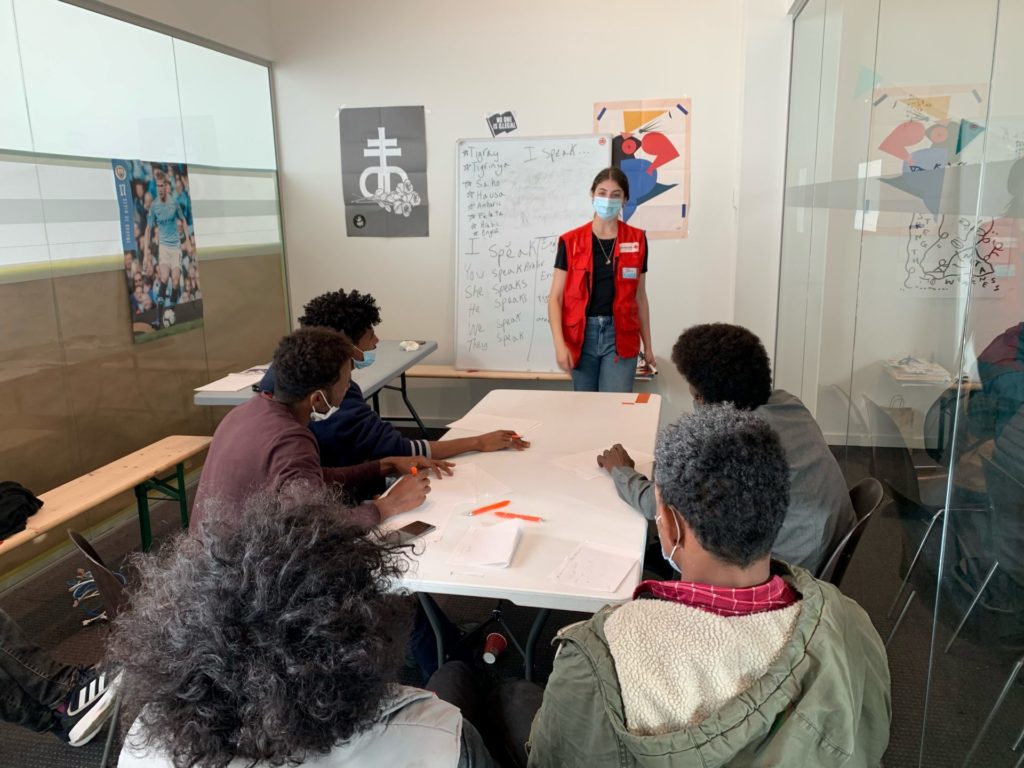Less than 5km from the Schuman roundabout, a Red Cross centre provides several hundred migrants and asylum seekers every day with food, shelter and washing facilities. This is the hidden face of an ongoing human crisis that has continued largely unnoticed by the public and the media during the Covid pandemic. A volunteer-led project is trying to make a difference to these people’s life chances by offering them the possibility to learn English.
Reza arrived in Brussels a couple of years ago after making the treacherous journey from his native Iran via Turkey and Greece. The political situation was the main reason for his departure, and he says that he won’t consider going back until the rights and freedoms that we take for granted in Europe are guaranteed in his home country. Reza dreams of getting a job in business or marketing in Belgium, but does not yet have the necessary paperwork. In the meantime, he is learning French and also working on his English.
Reza was one of around 30 students attending English language classes on a sunny Saturday afternoon when I visited the Red Cross centre on the Avenue du Port, close to Tour et Taxis. The English for Refugees project is a volunteer-led initiative sponsored by Serve the City Brussels. The Red Cross centre opened around a year ago in late 2020. It is located in a former showroom and garage of one of the big European car manufacturers.
Jon Brookes and Olivia Fambrini are the founders of the English for Refugees project, which has been running since February 2021. Jon is originally from Bristol and Olivia hails from Denver, Colorado. After initially helping with food distribution at the Red Cross centre, Jon was approached by several of the migrants and asylum seekers who wanted to improve their English. Olivia had recently arrived in Brussels after completing a degree in international migration. They now have a growing team of 20-30 volunteers who assist them with the Saturday afternoon lessons.
Participants come mainly from countries in North and East Africa (Ethiopia, Libya, Eritrea, Sudan …), but on the Saturday I visited there was also Reza from Iran, two young Roma girls from Slovakia and a Russian man who is apparently a regular.
One of the challenges for Jon and Olivia is adapting the content and teaching methods to the very different needs and realities of the participants. Many are transmigrants whose ultimate aim is to settle in another country, particularly the UK. Others have been living for years in Belgium as undocumented migrants. What they have in common is that for a number of reasons their situations aren’t catered for by the migration system and so they find themselves in a kind of legal limbo. It’s difficult for us to comprehend exactly how precarious this makes their lives. To illustrate the point, Olivia mentions that she discovered one of the students had been tired in class because he had spent the night locked in a goods lorry.
I asked Jon what motivates the participants to join their classes. He believes that a basic command of English is key for the day-to-day survival of beneficiaries, whether or not they end up staying in Belgium. Importantly, he adds that being treated with respect as students, and having an opportunity to develop themselves, are crucial in a context where they can often feel dehumanized. I was impressed by how engaged the participants were during the two-hour class, and several of the participants asked to take the printed materials away with them so that they could continue studying during the week. Many of them are making up for a lack of access to educational opportunities in their home countries.
English for Refugees is a young project, but it is already making a real difference to the lives of people who, as Jon describes it, are “falling through the cracks” of the immigration and asylum system. If you would be interested in volunteering, you can contact Serve the City. If you would like to donate English language books, these can also be dropped off with Serve the City. English for Refugees has recently launched a fundraiser (currently open until the end of October) which aims to raise €2000 to purchase English language books, dictionaries and other educational resources.


